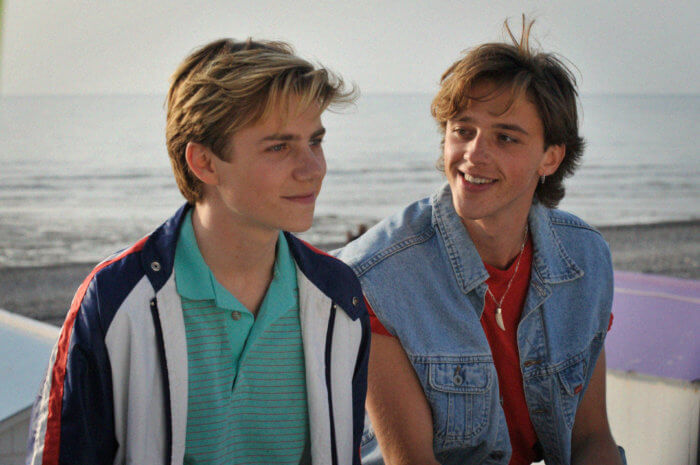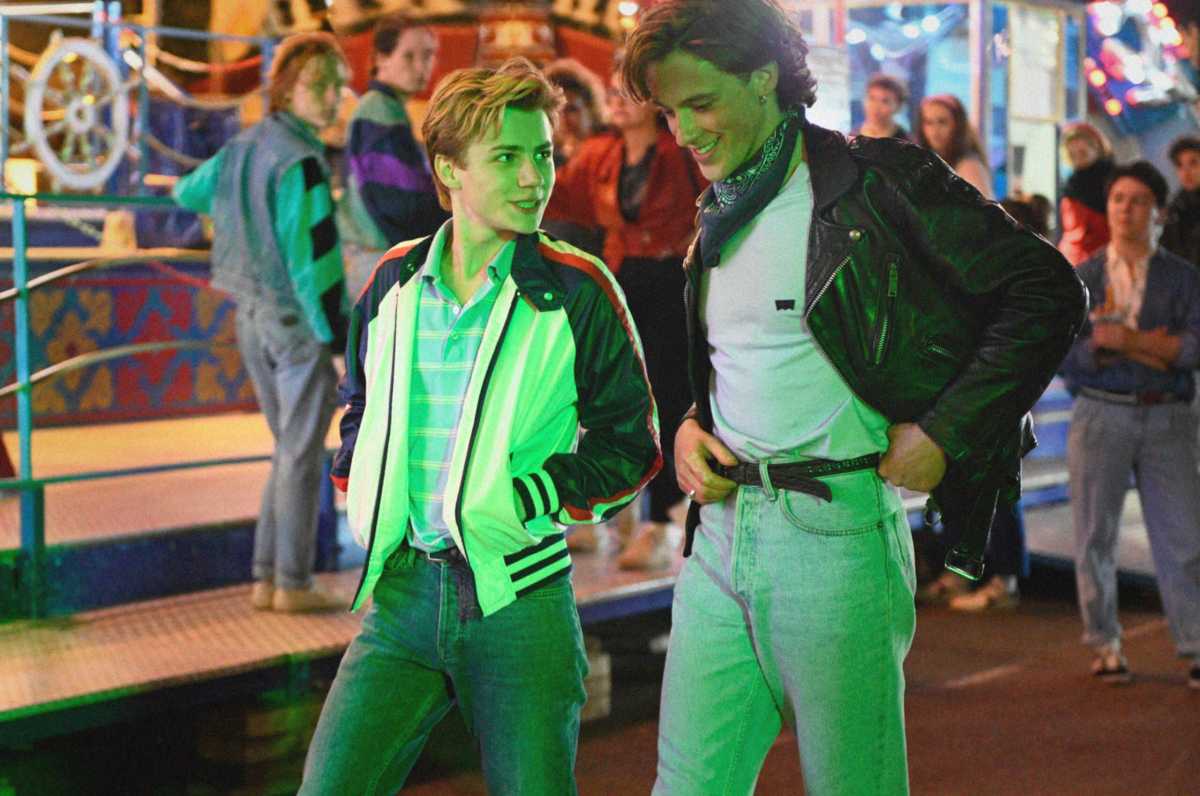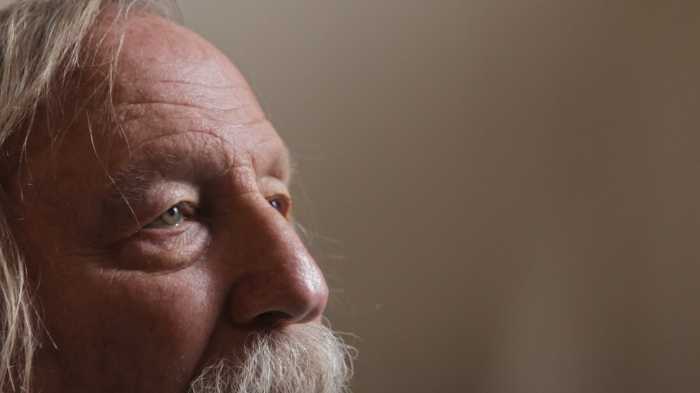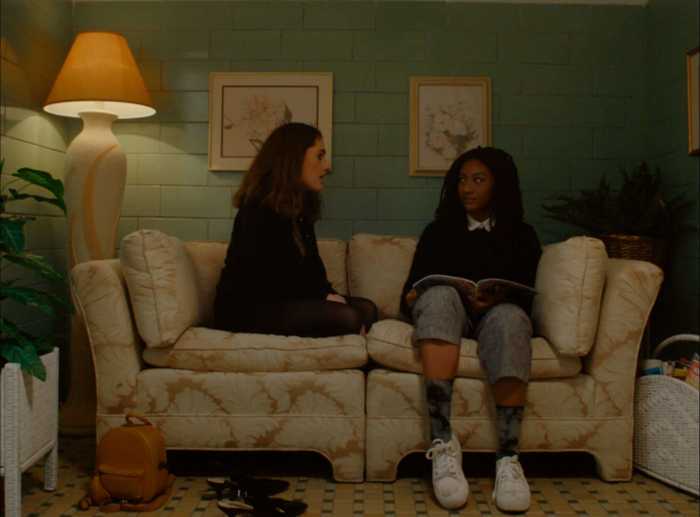“Summer of 85,” directed by the prolific gay French filmmaker François Ozon, puts pretty young men on display against an equally pretty sun, dazzlingly blue sky, and green waves. The mid ‘80s period setting also brings to mind a time when cinema began to be influenced by advertising, as directors who got their start in that medium turned to feature films. (It will be screened on 35mm at the Angelika and Village East.) “Summer of 85” is so picturesque that it looks like a fashion magazine spread come to life for 100 minutes. But it’s really just advertising the notion that it’s telling a passionate, even perverse love story, despite the inert evidence onscreen.
“Summer of 85” begins with Alex (Félix Lefebvre) getting arrested for dancing on the gravesite of his ex-boyfriend David (Benjamin Voisin). In a voice-over, he tells us that they swore an oath: “Whoever dies first, the other swears to dance on his grave.” The film then returns to their meeting six weeks earlier. Alex meets David when his boat overturns while sailing off Normandy’s coast. David manages to rescue him, and they begin hanging out together, despite their differences. David comes from a Jewish family who owns a shop in town, while Alex’s family is poorer. But Alex starts working at that shop, and the two teenagers become lovers, spending all their free time together for a brief period until David moves on to Kate (Philippine Velge).
Ozon goes by the old adage “show, don’t tell” here. The love story between Alex and David is a matter of bare torsos and lazy days in the sun. The cinematography sometimes darkens to adjust to the weather, but the blissed-out mood persists. However, “Summer of ‘85” keeps telling the spectator that it’s haunted by death, but never quite convinces — even when Alex dons drag to take a look at David’s corpse in the morgue.

British writer Aidan Chambers first came up with the idea for “Dance on My Grave,” the YA novel upon which “Summer of 85” is based, while working as a teacher in 1966. At the time, he read a news story about a 16-year-old boy arrested for desecrating a grave. Following a few failed attempts, he finally began writing the published version in 1979 and finished in 1982. At that time, the two teenage boys having sex would still have been illegal in the UK, where the age of consent for gay men was 21, but Chambers says that the book deliberately avoids labeling their sexuality or treating gayness as a problem. “Summer of 85” continues that approach. No one uses the word “gay” or seems to think in terms of sexual orientation, even though Alex is threatened by David’s apparent bisexuality and adults talk about their relationship gingerly at best, with hostility at worst. As in “Call Me By Your Name,” set in Europe around the same time with a very similar story, AIDS is never mentioned, but the way this story is defined by death suggests a faint allusion to it.
While a voice-over like the one running through “Summer of 85” is a common technique in French films, it symbolizes something else. Through David’s death, Alex becomes motivated to put his thoughts down on paper. Towards the end, the voice-over hints that it’s coming from an older, wiser version of Alex. He says “Please don’t think my story ends here. Maybe it’s just beginning.”
The opening scene clues us in that Alex and David’s relationship will not last. “Summer of 85” hints at a much grimmer idea than it actually develops: David had to die for Alex to become a writer. It’s not really a love story, just Alex’s origin story as an artist. But what it shows doesn’t really match the mood it tells us it’s expressing. Even in the more melancholy final 40 minutes, which take place after David’s passing, Ozon’s complete avoidance of grit takes us away from the tragedy the film describes. His images never stop looking like they’re ready for Instagram. The careful avoidance of onscreen sex doesn’t prevent “Summer of 85” from succumbing to “the pornography of taste,” as critic and filmmaker Kevin B. Lee described the flaws of Abdellatif Kechiche’s male-gaze lesbian epic “Blue Is the Warmest Color.” Alex’s exertions to Rod Stewart’s “Sailing” are a pale clone of the scene of Denis Lavant dancing to Corona’s “Rhythm of the Night” that closes Claire Denis’ “Beau travail.” For all its emphasis on teenage love, “Summer of 85” never shows many signs it has a beating heart.
SUMMER OF 85 | Directed by François Ozon | Music Box Films | In French with English subtitles | Opens June 18th at the Angelika Film Center, Village East, and Film at Lincoln Center





































